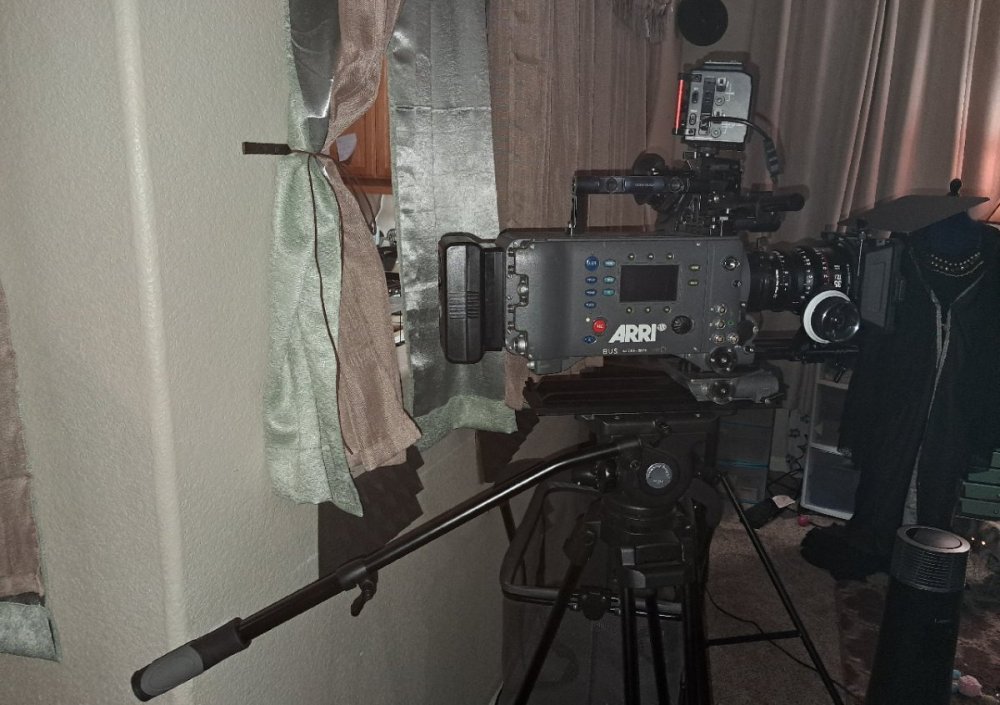
Matthew W. Phillips
Premium Member-
Posts
2,048 -
Joined
-
Last visited
About Matthew W. Phillips

- Birthday 10/28/1980
Profile Information
-
Occupation
Director
-
Location
Sacramento, CA
Recent Profile Visitors
-
Purchased an Alexa Classic in 2025. Am I crazy?
Matthew W. Phillips replied to Matthew W. Phillips's topic in ARRI
Thanks for the heads up. Can't afford an Amira so I'll live with the peaking it has. -
Purchased an Alexa Classic in 2025. Am I crazy?
Matthew W. Phillips replied to Matthew W. Phillips's topic in ARRI
I agree. Especially about the resolution. I dislike overly sharp footage. I keep a Black Pro Mist on my lens 24/7 just to soften the footage and my older eyes can't focus tack sharp anyway which I prefer as it reminds me of the footage I got shooting 16mm with an old Angenieux Zoom lens. -
Purchased an Alexa Classic in 2025. Am I crazy?
Matthew W. Phillips replied to Matthew W. Phillips's topic in ARRI
Hello Jon. Yes, you nailed exactly my thought process. I've never used a Canon C300, but I did know that I liked the look of the Classic. I tried Sony (a6xxx series, FX30, FX3, etc) and Blackmagic (P4K) and I never got anywhere near that look that I wanted (I really like the look of S16 Kodak 200t). Shooting on the Classic makes it easier for me to go hard with the grading and it has inherent qualities that those other cameras didn't. I know Yedlin says cameras are only data collection devices. But I'm not nearly talented enough with grading to make a BM cam look like 16mm film in a way that will convincing to my eyes. Now you also have me curious about the C300 too. -
Purchased an Alexa Classic in 2025. Am I crazy?
Matthew W. Phillips replied to Matthew W. Phillips's topic in ARRI
Thank you for this info! -
Purchased an Alexa Classic in 2025. Am I crazy?
Matthew W. Phillips replied to Matthew W. Phillips's topic in ARRI
Oh, did you ever shoot ARRIRAW? I never had anyone answer my question about whether it is worth the hassle to shoot on the Classic. I like the EVF so spending for a monitor would be a bummer, but if ARRIRAW is that much better, I would do it. Was it that much better in your view to warrant the expense or did 12-bit ProRes seem enough for you? -
Purchased an Alexa Classic in 2025. Am I crazy?
Matthew W. Phillips replied to Matthew W. Phillips's topic in ARRI
Thanks for the heads up. I will be shooting sync sound, but I'm so used to that from my film days that I really don't know anything else. I will likely have an assistant when it comes to shooting something important. I don't like handheld or "run and gun" as I'm too old for that and I never was very steady with any size cam. I like it on sticks and the most I would do aside from that would be a dolly or geared head. -
Purchased an Alexa Classic in 2025. Am I crazy?
Matthew W. Phillips replied to Matthew W. Phillips's topic in ARRI
1) I tried the pocket 4k but had Moire issues and some IR pollution. Everything else I looked at was more expensive than what I paid for this. 2) I bought it because I would like to make a few short films. It has been awhile since my last project and I'm itching to get back. My daughter is also a music major and is trying to break into performance and asked me to shoot a music video for her. 3) I see what you mean. I tend to think I might be poor because I live in Sacramento. My barely 6-figure salary isn't very impressive once I pay the rent (can't afford to buy a home here) 4) I love shooting nature and foliage. I try to plant things but I don't have a very good green thumb. When I shot a feature back in 2016, I spent hundreds of dollars at Green Acres (and hours or work) planting a beautiful garden in the backyard for the film. It lasted about 3 weeks for principle photography and then died on me. 😢 I love it but not sure it loves me 😄 5) No, I would love to though. But I don't own this property and probably wouldn't get permission to plant them. -
I've been wanting this camera for years now but it was either too expensive or I found some reason to not buy it (people saying it's too heavy or not a good choice because it's only 2k). After trying out a Blackmagic pocket kit (and enjoying interiors but not exteriors so much), I had to try it. I had a thread here a few years back about it, I think. Anyhow, I added a pic of my rig (all budget stuff since I'm poor) and some early stills from camera tests so far. I personally like it but it gives me a workout handling it. I do have one question for those here...would I see much of a benefit to getting an Odyssey and recording ARRIRAW? I like the ProRes 4444 but not sure if I'm missing out not shooting RAW. I don't like monitors personally (I prefer the EVF) but would be willing to go that route if the improvement is signficant. Also, noob question, but is there a way to change focus peaking color to red? I got better focus on my pocket than this because I could actually see the peaking easier. My middle age eyes aren't as good as they once were. Thanks for reading.
-
Can there really be too much dialogue in a film?
Matthew W. Phillips replied to Leonardo Thaci's topic in Off Topic
It depends on the movie, I suppose. I don't always agree with "show, don't tell." I am a lore junkie so I enjoy hearing the backstory of a world being presented in a film. Sure, a few quick action sequences to go along with that can be nice but I don't need a lengthy ridiculous flashback when it can be much quicker to just relay the information using a basic conversation (along with some interesting music.) If done well, I suppose either way can work. -
I haven't posted here in awhile but I have been watching a ton of camera reviews lately. After discovering the new Arri 35 camera and downloading any samples I can from the camera, there is something about the image it produces that makes me want it so bad (and nothing else.) I really can't afford the camera but all of the cheaper alternatives all have something about them that sticks in my mind against this camera and I can't bring myself to consider those. It might be the first digital cinema camera that I would prefer over a 35mm film camera with a wheel barrow full of film. My question is: What makes this camera so special? I know it has tons of DR but I also notice crazy color separation and such ease to sculpt it to whatever you want in post. Also, my question is: is there anything at all that a mere mortal like myself can do to get my hands on it; even if only for a day or two? P.S.- I cannot help but enjoy reading the salty comments on YT from Blackmagic fans who remark that their 4k/6k pockets are superior to this camera. Is this camera a "love it or hate it" thing? Because all I see is absolute amazement from it. Nice to see you all again, by the way!
-
Dehancer OFX film emulation plugin
Matthew W. Phillips replied to Anfisa Zelentsova's topic in Post Production
Is this argument scientific or anecdotal? Some people swear that they can tell the difference between 4k and 1080p even on relatively small screens. Some audiophiles can also tell the difference (or claim to) between seemingly insignificant details. Are these people crazy or could it be that everyone is different and values different things? -
Dehancer OFX film emulation plugin
Matthew W. Phillips replied to Anfisa Zelentsova's topic in Post Production
So what you are arguing is that either 1) grain cannot be larger than 1 pixel OR 2) if grain is larger than 1 pixel for, say, full HD, the true resolution of film is less than 1920 x 1080? -
WTB: S16 Aaton LTR/XTR/XTR Prod or Arri SR2/3
Matthew W. Phillips replied to Nehemiah Stark's topic in Cine Marketplace
Why 20 pages? Isn't brevity the soul of wit? -
WTB: O'Connor 50D FH with sticks
Matthew W. Phillips replied to Matthew W. Phillips's topic in Cine Marketplace
I no longer need one of these as I am going for a smaller/lighter camera setup. Thanks anyway. -
What's a great editing program to use?
Matthew W. Phillips replied to Jon O'Brien's topic in General Discussion
It is amazing on a PC. Since PCs tend to have more "bang for your buck" than a Mac, you are likely to get better performance per dollar spent on a PC. Most PCs that are priced in the range of Apple products will have far superior graphics cards which will give you great performance.















